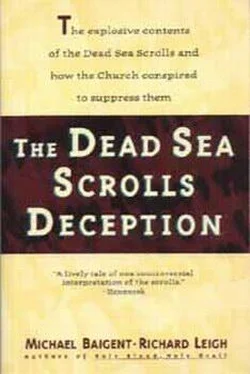Within the first year of the revolt, Simeon had destroyed at least one complete Roman legion, and probably a second. 34Palestine had been effectively cleared of Roman troops. Jerusalem had been recaptured and a Judaic administration installed there. The campaign came within a hair’s-breadth of total success. It failed primarily because Simeon was let down by his expected allies. According to his overall grand design, his troops were to be supported by forces from Persia, where a great many Jews still resided and enjoyed the sympathetic favour of the reigning dynasty. Just when Simeon most needed these reinforcements, however, Persia itself was invaded from the north by marauding hill tribes, who effectively pinned down Persian resources, leaving Simeon bereft of his promised support. 35
In Syria, safely outside Palestine, the Romans regrouped under the personal leadership of the Emperor Hadrian, with Julius Severus, formerly governor of Britain, as his second-in-command. Another full-scale invasion ensued, involving as many as twelve legions, some eighty thousand troops. In a two-pronged advance, they fought their way from post to post down the entire length of the Holy Land. Eventually Simeon was cornered, making his last stand at Battir, his headquarters, a few miles west of Jerusalem, in ad 135.
During the entire course of the revolt, Simeon’s troops were in constant occupation of Qumran. Coins found in the ruins attest to their presence in what would, after all, have been a site of considerable strategic importance. It is thus possible, despite the claims of Father de Vaux, that some, at least, of the Dead Sea Scrolls were deposited in Qumran as late as Simeon’s time.
Once the broad messianic movement of 1st-century Palestine is seen in perspective, and once the apparently diverse sects are seen as integral parts of it, a number of hitherto inexplicable elements and anomalies slip into place. Thus, for example, the apocalyptic and eschatological ferocity of John the Baptist begins to make sense, as does his role in the events recounted by the Gospels. Thus, too, can one account for a number of theologically awkward passages and incidents pertaining to Jesus’ own career. There is, as we have noted, at least one ‘Zealot’ in his following, and possibly more. There is the violence of his action in overturning the tables of the money-changers at the Temple. There is his execution not by Judaic but by Roman authorities, in a fashion specifically reserved for political offenders. There are numerous other instances, which the authors of this book have examined at length elsewhere. Finally, there are Jesus’ own words:
Do not suppose that I have come to bring peace to the earth; it is not peace I have come to bring, but a sword. For I have come to set a man against his father, a daughter against her mother… (Matt. 10:34-5)
And, more tellingly still, in unmistakably Qumranic phraseology:
Do not imagine that I have come to abolish the Law or the Prophets. I have come not to abolish but to complete [or fulfil] them… not one dot, not one little stroke shall disappear from the Law until its purpose is achieved. Therefore the man who infringes even one of the least of these commandments and teaches others to do the same will be considered the least in the Kingdom of Heaven. (Matt. 5:17-19)!
In this passage, it is almost as if Jesus had anticipated Paul’s advent. Certainly he could not have warned against it any more specifically. By the standards he lays down, Paul’s status in the Kingdom of Heaven cannot be much higher than that of official pariah-in-residence.
Another anomaly that emerges in a fresh light is the fortress of Masada, and the character and mentality of its tenacious defenders. When the Holy Land rose in revolt in ad 66, Masada was one of the first strongholds to be seized — by Menahem, the son or grandson of Judas of Galilee, founder of the ‘Zealots’. Perched high on a sheer-sided mountain overlooking the south-western shore of the Dead Sea, some thirty-three miles below Qumran, the place became the rebels’ most important bastion, the supreme symbol and embodiment of resistance. Long after that resistance had collapsed elsewhere, Masada continued to hold out. Jerusalem, for example, was occupied and razed within two years of the insurrection’s outbreak — in ad 68. Masada remained impregnable, however, until ad 74. From within its walls, some 960 defenders withstood repeated assaults and a full-scale siege by a Roman army estimated to have numbered fifteen thousand.
Despite the tenacity of this resistance, Masada’s position, by the middle of April ad 74, had become hopeless. Cut off from reinforcement, entirely encircled by Roman troops, the garrison no longer had any prospect of withstanding a general assault. The besieging Romans, after bombarding the fortress with heavy siege machinery, had constructed an immense ramp running up the mountainside and, on the night of 15 April, prepared for their final onslaught. The garrison, under the command of Eleazar ben Jair, came to their own decision. The men killed their wives and children. Ten men were then chosen to kill their comrades. Having done so, they proceeded to draw lots, choosing one to dispatch the remaining nine. After he had performed this task, he set fire to what remained of the buildings in the fortress and killed himself. Altogether, 960 men, women and children perished. When the Romans burst through the gate the following morning, they found only corpses amid the ruins.
Two women and five children escaped the carnage, supposedly having hidden in the water conduits under the fortress while the rest of the garrison killed themselves. Josephus recounts the testimony of one of the women — drawing, he says, on her interrogation by Roman officers. 2According to Josephus, she furnished a detailed account of what transpired on the last night of the siege. If this account is to be believed (and there is no reason why it shouldn’t), Eleazar, the commander of the fortress, exhorted his followers to their mass suicide by his charismatic and persuasive eloquence:
Ever since primitive man began to think, the words of our ancestors and of the gods, supported by the actions and spirits of our forefathers, have constantly impressed on us that life is the calamity for man, not death. Death gives freedom to our souls and lets them depart to their own pure home where they will know nothing of any calamity; but while they are confined within a mortal body and share its miseries, in strict truth they are dead.
For association of the divine with the mortal is most improper. Certainly the soul can do a great deal when imprisoned in the body; it makes the body its own organ of sense, moving it invisibly and impelling it in its actions further than mortal nature can reach. But when, freed from the weight that drags it down to earth and is hung about it, the soul returns to its own place, then in truth it partakes of a blessed power and an utterly unfettered strength, remaining as invisible to human eyes as God Himself. Not even while it is in the body can it be viewed; it enters undetected and departs unseen, having itself one imperishable nature, but causing a change in the body; for whatever the soul touches lives and blossoms, whatever it deserts withers and dies: such is the superabundance it has of immortality. 3
According to Josephus, Eleazar concludes: ‘Let us die unenslaved by our enemies, and leave this world as free men in company with our wives and children. That is what the Law ordains.’ 4
On occasion, Josephus is unreliable. When he is so, however, it shows. In this instance, there is certainly no reason to doubt his word; and the excavations of Masada conducted in the 1960s tend to support his version of events. It is, of course, probable that he embellished Eleazar’s speeches somewhat, making them perhaps more eloquent (and long-winded) than they might actually have been, availing himself of some poetic licence. But the general tenor of the narrative rings true, and has always been accepted by historians. What is more, Josephus had a unique and first-hand understanding of the mentality that dictated the mass suicide at Masada. At the beginning of the revolt, he himself had been a rebel commander in Galilee. In AD 67, his forces were besieged by the Romans under Vespasian at Jotapata — now Yodefat, near Sepphoris. When the town fell, many of its defenders committed suicide rather than submit to capture. Many others, including Josephus himself, fled and hid in caves. According to his own account, he found himself in one cave with forty other fugitives. Here, as at Masada, lots were drawn as to who would kill his comrades. Whether ‘by chance’, as Josephus suggests, or by ‘the providence of God’, or perhaps by a fiddle which aided and abetted one or the other, he and another man ended up as the sole survivors. Persuading his companion to surrender, he then himself defected to the victorious Romans. 5He does not emerge from the adventure in any very creditable light, of course. But even if he himself could not live up to them, he was no stranger to ‘Zealot’ attitudes, including their preparedness for self-immolation in the name of the Law.
Читать дальше












